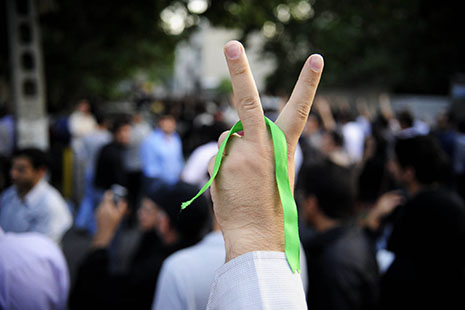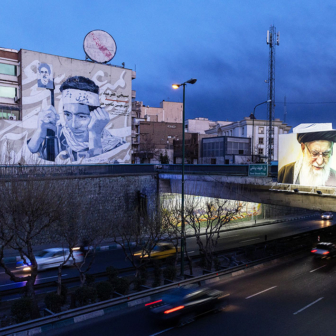AT 10.30 on the morning of 27 September 1981 all hell broke loose in central Tehran. In simultaneous attacks within a kilometre of the Australian embassy, where I was acting head of mission, the leftist Islamic Mujaheddin set buses on fire, filling our office with smoke, and attacked the Revolutionary Guards who arrived on the scene. Light and heavy weapon fire and ambulance sirens screamed from all directions.
Nearly three years of constant violence had followed the Islamic revolution of February 1979, but the summer of 1981 was particularly turbulent. In late June the headquarters of the régime’s political arm, the Islamic Republican Party, was bombed, killing many of its leaders. Tehran had become so used to violence that life hardly paused after the simultaneous assassinations of the president and prime minister in September. Among the Iranians I knew, three had close relatives killed or arrested during the street demonstrations that were broken up by motorcycle squads of Hezbollahis, the forerunners of today’s Basij paramilitary.
The Mujaheddin’s effort to provoke a popular uprising failed. I watched as Revolutionary Guards blindfolded about fifteen young girls in an empty lot across the street from the embassy and hustled them into a minibus with blacked-out windows. Soon after, three blindfolded young men were led into a shed by the side of the empty lot to await the return of the minibus. Even in the middle of an urban civil war, the proper segregation of the sexes had to be observed. A wave of executions followed, so it is unlikely that any of them survived the night.
It seemed to me at the time that the Islamic régime would survive in the absence of any strong, identifiable alternative leadership group or a single rival to Ayatollah Khomeini. The Iranian Islamic régime only survived the violent challenges of its early years because Ayatollah Khomeini was a widely revered leader with a fervent support base among the poor and the devout middle class. I thought that Australia had no choice but to engage with the Iranian régime, however distasteful it was.
But Khomeini died twenty years ago. The fervour has gone. And today’s contending Iranian leaders have not forgotten that the Islamic revolution barely survived. This partly explains their harsh response to any political challenge. The transparent rigging of the recent presidential election result, reportedly because the leadership feared president Mahmoud Ahmadinejad would be forced to a second round ballot, and lose it, can only be explained by the fear of losing absolute control.
The régime now fears a “soft revolution,” by which the United States could penetrate Iranian culture society and politics, according to Roxana Saberi, the Iranian-American journalist who was released on 11 May from imprisonment in Tehran for “acting against national security.”
Yet, even as it prepared to rig the presidential elections, the régime seems to have sent signals to the Obama administration that it is willing to open negotiations with the United States on their differences, including Iran’s nuclear program. According to an anonymous Iranian student writing in the New York Times on 19 June, there is a widespread perception in Iran that Ahmadinejad can do a “Nixon to China” by bringing his hard line supporters along with an opening to the United States.
But the Nixon parallel breaks down because Nixon made his opening to China before the Watergate scandal broke his legitimacy as a leader, not after. The post-election protests in Tehran show that, like Marcos in the Philippines in 1986 and Suharto in Indonesia in 1998, the Islamic régime has governed too ineptly and tried to win one election too many. Its fear of opposition has betrayed its weakness. Mir Houssain Moussavi has emerged as a competent and determined political leader.
A successful outcome to the apparent internal struggle between supreme leader Ayatollah Ali Khamenei and more moderate clerics depends partly on the United States and its allies continuing to exercise restraint in commenting on the unfolding events in Tehran. As the president of the National Iranian American Council, Trita Parsi, said on 23 June: “If our intention is to help, we have to first listen to the people in Iran rather than pretend to speak for them without ever having consulted with them.”
The Obama administration has dealt itself a fairly strong hand in this situation. The president’s respectful Now Ruz (New Year) address to the Iranian people on 20 March and his silence before the elections were wise strategic choices. Compare that with President Bush’s message to the Iranian electorate before the 2005 presidential elections – “And to the Iranian people, I say: As you stand for your own liberty, the people of America stand with you” – which fed into Ahmadinejad’s successful political line that “the United States does not show Iran respect.” The New York Times reported from Tehran on 28 June 2005, after Ahmadinejad’s election, that this was an argument that “resonates with the public.”
President Obama’s comments at a White House press conference on 23 June were pitched in exactly the right terms to give moral encouragement to the demonstrators and discourage violence by the régime, without arming the régime with credible charges of western meddling. “The Iranian people,” he said, “can speak for themselves.” He went on to speak in the language of rights, which he has used since the post election crisis developed: “The Iranian people have a universal right to assembly and free speech. If the Iranian government seeks the respect of the community, it must respect those rights and heed the will of its own people.”
The Iranian régime has, of course, accused the United States, Britain and Western countries generally of meddling, but the president’s restraint serves the essential purpose of depriving these tired accusations of oxygen.
What then should western countries like Australia do in response to events in Iran? First, they should continue to emphasise the rights of Iranians to free speech and peaceful assembly – rights that Iran, as a party to the International Covenant on Civil and Political Rights, is bound to uphold. This is not “meddling”: all states have an interest in the upholding of universal human rights.
Second, as traditional diplomats would recommend, western countries should observe a period of “masterly inactivity,” even if this does not play well in the twenty-four hour news cycle. The next moves depend on the judgement of the Iranian opposition. President Obama has struck the right note of respect and restraint. We must wait for it to work. Khamenei, Ahmadinejad and their allies will fall, perhaps not now, perhaps not violently, but inevitably. •




